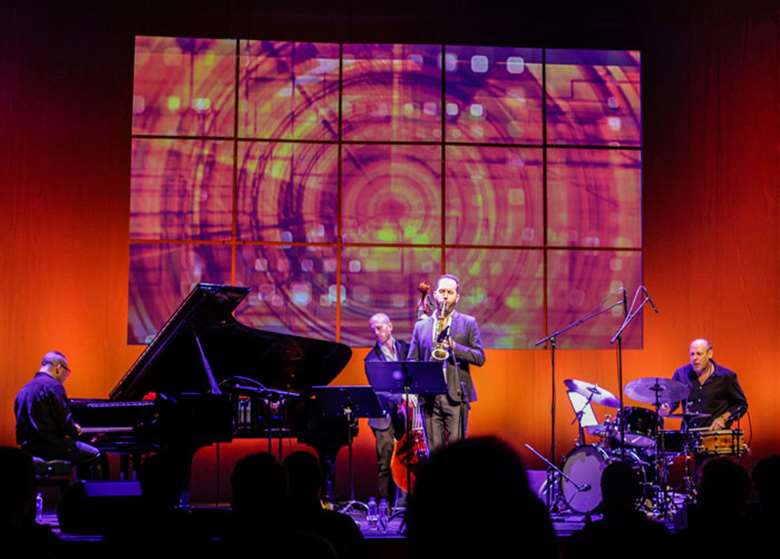Gonzalo Rubalcaba and Mark Dresser suitably masterful at Umea's Swedish summit
Tuesday, November 1, 2016
In 1968, the inaugural year of the Umea Jazz Festival in Sweden, an all-conquering cohort of six-string heroes were wiring Fenders and Gibsons into the frontal cortex of popular culture, the ongoing brainwaves of which can be seen in the truly astounding Guitar Museum that is around the corner from the multi-purpose Folkets Huus, whose several auditoriums host some 45 gigs in four days.

Fittingly, two guitar-led groups, of which Jimi, Chuck B and Bo D would have been proud, capture the imagination. Norway's Hedvig Mollestad consolidates her growing reputation with a set that builds effectively on the classic power trio template, mixing hefty Led Zep-ish backbeats with slaloming unison riffs and bursts of quite wildly crackling distortion.
Sweden's Susanna Risberg, also opting for a drums and bass accompaniment, couldn't strike a greater contrast, and stakes a strong claim as a potentially significant new arrival in contemporary jazz. Two years ago she impressed at a Jazzahead showcase and she has since grown as a soloist and composer. Many of her pieces have pleasingly askew melodic lines and rhythmic frameworks that shift between the dynamic and static, introducing welcome subtleties into moments when the improvisations reach fever pitch. Risberg has some of the piercing, steely tonal richness of maverick players in the mould of Gábor Szabó, and she deconstructs themes with an eye-of-the-needle precision, finding myriad phrasal variations, often in volleys of quicksilver sixteenth notes, while keeping tight on the pulse of the music. There is also a subversive streak in her personality that draws attention, above all when she takes time to point out that a newly commissioned set of songs is dedicated to African nations as a result of her discovering more about the ghastly realities of colonialism.
A special showcase of Young Nordic Jazz Comets is a strong sign that Risberg's generation has much to offer and groups from Finland (Ok:Ko), Denmark (Dyberg/Balvig/Nesheim/Kovacs), Estonia (Anna & Solvi) and Sweden (Daniel & Dundret) all show promise to varying degrees, perhaps with Norway's potent Megalodon Collective making the biggest splash by way of a bulky two-drummer rhythm section and rhapsodic Ra-like horns. To a certain extent a loose summary of all of the above comes courtesy of a pan-Scandinavian ensemble led by a veteran with a strong stage presence: Marilyn Mazur. Her Shamania ensemble blends elements of ritual theatre, dance and predominantly African rhythms laced with a sprite-like humour, and though some of the arrangements are a touch overwrought, the energy is engrossing.
Among the other big names on the bill the pick of the bunch is the outstanding Cuban pianist Gonzalo Rubalcaba (pictured top) whose American quartet, bolstered by the presence of New York-based British alto saxophonist Will Vinson is imperious, playing a Charlie Haden tribute that captures the particular quality of soulful, shadowy lament that pervaded much of the music of the late American (and former Rubalcaba collaborator). The pianist's sound, created both by his articulation and masterful manipulation of pedals, bewitches at times, as does his ornate phrasing and interaction with a fine rhythm section anchored by drummer Jeff Ballard and bassist Matt Brewer. Not all of the headliners deliver as convincingly though. Norwegian trumpeter Matthias Eick's Midwest project is a languorous trawl through a kind of Nordic Americana that is disappointingly formulaic and Swedish electric combo Mats/Morgan's collaboration with the Norrlands Operans Symphony Orchestra does not make judicious use of the significant resources on show. Quite surprisingly, the same can be said of Norwegian pianist-producer Bugge Wesseltoft, whose celebration of 20 years of his highly-influential Jazzland label is a strangely muted affair in which the young talents to which he generously gives a platform shine individually without quite combusting as an ensemble. As is the case with Eick, a very basic failing is a lack of variety in tempo that is compounded by song structures that lean towards sketch rather than fully-fledged arrangement. There is a decisive change in the energy of the room when the pace picks up and the band is emboldened to groove with previously unheard vigour.
The most adventurous piece of programming from artistic director Lennart Strömbäck provides an object lesson in how to do just that and the artist in question is playing solo. American bassist-composer Mark Dresser is a master player whose rhythmic ingenuity – I think of the unforgettable set he played with Andrew Cyrille and Marty Ehrlich at the old Vortex way back when – and conceptual verve leave the audience rapt. His command of a purpose-built bass with a slightly trebly tone that is anything but flimsy is superlative, especially as he is able to draw a kind of vivid organic reverb on some notes by means of his attack. Dresser's sonic creativity goes to another level when he places a metal clamp with long spikes protruding like antenna on the bridge of the bass. It lends a unique mbira-like quality to his timbres, and although not a plugged-in wah wah pedal it still has enough richness to warrant a place in the nearby Guitar Museum. Hendrix would have been charmed. The legacy of black music in Sweden, though, is more direct, certainly when one thinks of the impact that was made by Don Cherry in the 1970s. Umea maintains an intelligent link to a range of exciting voices from America, Europe, Africa and beyond.
– Kevin Le Gendre
– Photo by Melina-Hägglund